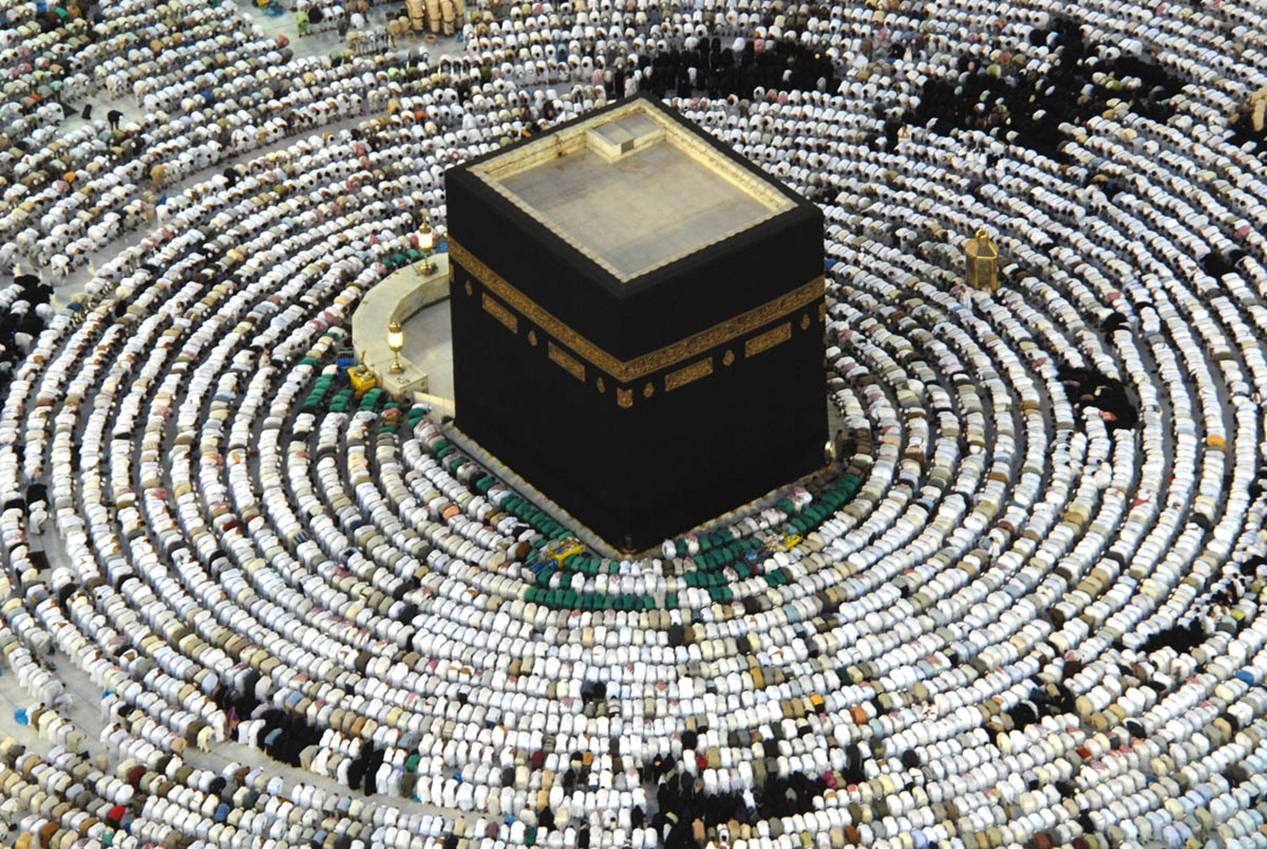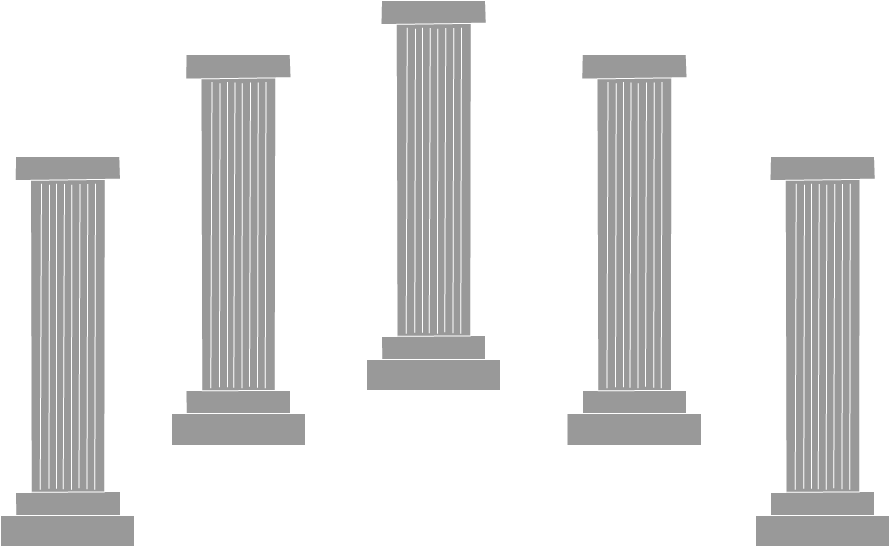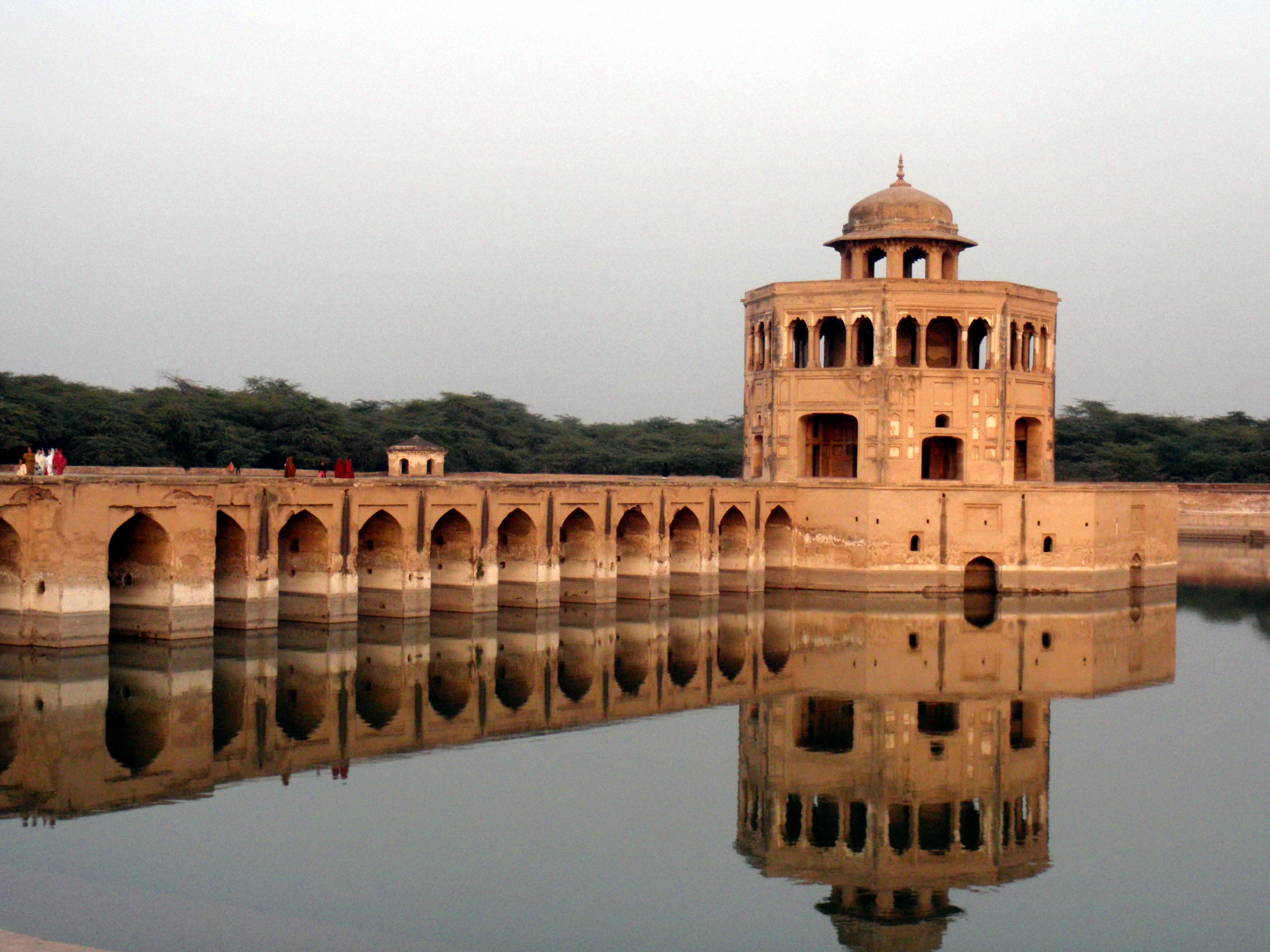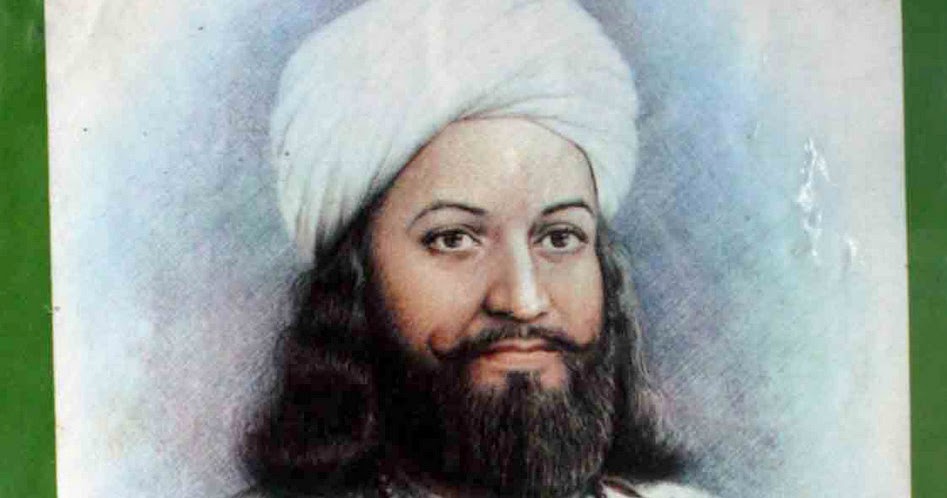|
|
|
Welcome To Sheikhupura - Today is
|
 Islam
What Does ‘Islam’ Mean? :
“Islam” is an Arabic term which means to submit one’s will to the will of God. Islam is a monotheistic religion that teaches that there is only one divine being, one supreme Creator of the universe. Muslims believe that Islam is the true religion of God revealed to humanity. It is a universal religion that can be practiced by anyone at any time and in every place. The central concept of this way of life is total submission to God.
Islam
What Does ‘Islam’ Mean? :
“Islam” is an Arabic term which means to submit one’s will to the will of God. Islam is a monotheistic religion that teaches that there is only one divine being, one supreme Creator of the universe. Muslims believe that Islam is the true religion of God revealed to humanity. It is a universal religion that can be practiced by anyone at any time and in every place. The central concept of this way of life is total submission to God.
Islam is a complete, holistic way of living that covers every aspect of life. Islam leaves no stone unturned as it teaches mankind on how to behave in every area of life: individual, social, material, moral, ethical, legal, cultural, political, economical, and global.
What is a Muslim? :
A Muslim is anyone who submits their will to the one and only true God who is worthy of worship, “Allah” (God). A Muslim also believes in the Prophet Muhammad (peace be upon him) as the last and final prophet of God. By submitting oneself and worshiping Allah (God), a Muslim attains peace through obedience to his commandments. Peace is a natural result of submitting to the will of Allah.
For a person to become a Muslim and accept Islam as their faith, they must say and believe in the following phrase:
لآ اِلَهَ اِلّا اللّهُ مُحَمَّدٌ رَسُوُل اللّهِ
La ilaha illa Allah. Muhammad rasool Allah
This sentence literally means “There is no God but Allah and Muhammad is His messenger.” The sentence also means “There is none worthy of worship except Allah, and Muhammad is His messenger.” The moment a person says this phrase and begins to act upon it they become a Muslim.
Who is Allah? :
Allah is the name God Almighty has given Himself as is mentioned many times in the Holy Quran.
Say: He is Allah, (the) One; Allah, the Eternal; He did not beget (give birth) and He was not begotten (given birth to); And there has never been anyone equal to Him.
Qu'ran, Chapter 112, Verses 1 - 4
Muslims believe He has no partners in divinity, which includes having no son, and nothing in the universe is similar to Him. Muslims believe that Allah is the Originator and Sustainer of the universe and that he created human beings for only one purpose: to worship Him alone.
To worship anything besides Allah is considered a grave sin. The reward for worshiping Him alone and following his path is goodness in this world and Paradise in the next .
The Holy Quran :
The Holy Qur’an is the last revelation from Allah sent to all of mankind and it was revealed to his final messenger, Prophet Muhammad (peace be upon him).
A core belief taught in Islam is that human beings are unique from among God’s creation. We have the ability to think freely and choose to behave in any way we wish. In order to communicate and guide mankind, Allah sends Prophets and Messengers with scriptures to teach mankind about the true message.
Muslims believe that many scriptures have been revealed to mankind in the past. They include the Torah sent to Moses, the Psalms sent to David, and the Gospel sent to Jesus Christ (peace be upon them all).
Muslims believe that Islam is not a new religion, but rather a continuation and completion of the message revealed to the Prophets of the past. Allah teaches in the Quran:
Say (O Muhammad): “We believe in Allah and in what has been sent down to us, and what was sent down to Ibrahim (Abraham), Ismail, Ishaq (Isaac), Ya’qub (Jacob) and Al-Asbat [the twelve sons of Ya’qub (Jacob)] and what was given to Musa (Moses), ‘Isa (Jesus) and the Prophets from their Lord. We make no distinction between one another among them and to Him (Allah) we have submitted (in Islam).
Quran, Chapter 3, Verse 84
Who is Prophet Muhammad? :
From the beginning of mankind until the present day Allah has sent a Prophet to every nation to guide them to the truth. They were sent to teach their people to worship God alone and not to ascribe any divine partners to Him.
The names of these Prophets may sound familiar to you. They include Adam, Nuh (Noah), Ibrahim (Abraham), Ismail, Ishaq (Isaac), Yaqub (Jacob), Jesus, Muhammad, and many others (peace be upon them all).
Muslims believe Jesus to be a Prophet of God rather than a divine being or son. We will cover this difference in faith between the Muslims and Christians in a future guide.
The 5 Pillars of Islam :

The religion of Islam stands on five pillars. It is recorded that the Prophet Muhammad (peace be upon) said:
There are five basic religious acts in Islam, collectively known as 'The Pillars of Islam' (arkan al-Islam; also arkan ad-din, "pillars of religion"), which are considered obligatory for all believers. The Quran presents them as a framework for worship and a sign of commitment to the faith. They are (1) the creed (Shahada), (2) daily prayers (Salah), (3) almsgiving (Zakat), (4) fasting during Ramadan (Sawm) and (5) the pilgrimage to Mecca (Hajj) at least once in a lifetime.[96] Both Shia and Sunni sects agree on the essential details for the performance of these acts.[97] Apart from these, Muslims also perform other religious acts. Notable among them are charity (Sadaqah) and recitation of the Quran.
“Islam has been built on five [pillars]: testifying that there is no deity worthy of worship except Allah and that Muhammad is the Messenger of Allah, establishing the salah (prayer), paying the zakat (obligatory charity), making the hajj (pilgrimage) to the House, and fasting in Ramadan.”
Prophet Muhammad (peace be upon him)
1. Belief in One God and the Testimony of Faith (Tawheed) :
Tawheed (pronounced tow-heed) is an Arabic term which refers to the unique belief in the oneness of God. It is Islam’s concept of monotheism in which the religion’s core tenets are built upon.
It refers to the belief that there is only one divine being that is worthy of worship – Allah. When Muslims mention the name of Allah, they are calling out to the one true God of the universe.
Tawheed is the first and the most important pillar of the five pillars of Islam. Believing and acting on this pillar is the key to entering Islam. In order to become a Muslim and enter into the fold of Islam a person must pronounce the testimony of faith, or shahada in Arabic. The testimony of faith is a single statement:
لآ اِلَهَ اِلّا اللّهُ مُحَمَّدٌ رَسُوُل اللّهِ
“Laa ilaha illa Allah Muhammad Rasoolullah”
This sentence means “There is no God but Allah and Muhammad is His Messenger.”
It means to admit and to believe that none deserves to be worshipped except Allah, and Muhammad is Allah’s Messenger. The entirety of the religion and all of its teachings is built upon the foundation of this belief in God.
The testimony of faith (shahada) is the most important thing in the life of a Muslim. The words “La ilaha illAllah” are announced during the call to prayer and in sermons. It is the phrase by which the earth and heavens were raised. Every single creation was created for this phrase. This is the phrase which distinguishes between a Muslim and a person of another faith.
There are two parts of the first half of the testimony of faith. Let’s break it down:
Part 1:
لآ اِلَهَ اِلّا اللّهُ
“Laa ilaha illa Allah”
“Laa ilaha illa Allah” which means “there is no god but Allah” or “none has the right to be worshipped except Allah.” This part of the testimony nullifies all forms of worshipping anyone or anything other than Allah. Worshipping other divine beings is considered to be a grave sin in Islam.
With this phrase, you are affirming that Allah alone is the Creator, Ruler, and Sustainer of all things, and He alone is deserving of our worship.
Part 2:
مُحَمَّدٌ رَسُوُل اللّهِ
“Muhammad Rasoolullah”
The second half of the testimony of faith means “Muhammad is the Messenger of Allah.” To believe in this statement is to bear witness that Muhammad is the Messenger of Allah. It also means to follow what he says, obey him in what he orders us to do, to stay away from what he forbids, and to worship Allah only in ways that were legislated.
You also believe that Allah sent his Messenger (peace be upon him), revealed the Qur’an to him, and commanded him to call the people to Tawheed (belief in the oneness of God).
2. Prayer (Salah) :
The prayer is the second most important pillar in Islam, and it is the first thing that a person will be held accountable for on the Day of Judgment.
If the person’s prayer is good, then that person will be successful. But if the person’s prayer is incorrect in some way, then that person will have achieved failure. There are five obligatory prayers that every sane adult Muslim has to observe every day. Allah tells us about these prayers in the Qur’an:
Guard strictly (five obligatory) the prayers especially the middle prayer (i.e. Asr). And stand before Allah with obedience.
Qur'an - Chapter 2, Verse 238
The five daily prayers are:
Fajr (early morning, before dawn)
Duhr (mid-day, just after noon)
‘Asr (mid afternoon)
Maghrib (just after sunset)
Isha (at night, after dark has fallen)
The prayer is the link between a person and Allah. It is an intimate relationship a person has with His Creator and it should be performed to the best of one’s ability.
One of the many things that Islam is known for is the brotherhood and sisterhood between Muslims. One of ways this feeling of belonging is achieved is through the prayer in congregation.
3. Giving Wealth to Zakat
Zakat is the third pillar of Islam. It is a specified portion of a Muslim’s wealth that is given to those in need. It is the amount given once a year to support specific categories of people. The amount is about 2.5% of total wealth which includes the following asset classes:
Gold and silver
Precious metals
Stocks and shares
Real estate
Cash
Agricultural livestock
These are the most common asset classes for which Zakat is paid from.
The linguistic meaning of zakat is “that which purifies.” It is considered to be a way for Muslims to purify their wealth and income. Similar to how the prayer (salah) purifies a person’s soul, zakat purifies your assets and earns you the pleasure of Allah because your wealth is distributed to those in need.
Allah has enjoined upon the Muslims zakat which is taken from those who have wealth and given to those in need.
Zakat is only obligatory for Muslims who have reached puberty (i.e. they are adults), are mentally stable, and are financially capable. Furthermore, the amount of wealth a person has must reach a certain threshold known as the nisaab. The nisaab is a minimum amount of wealth a person must have before zakat becomes due upon them. The wealth should be in their possession for one year.
This pillar of Islam is not required for those who do not meet the criteria above. For example, if you are a university student with plenty of debt, a father who lives paycheck to paycheck, or a person whose wealth has not reached the nisaab (minimum amount) then zakat is not required for you to pay.
We hope to cover the pillar of Zakat in greater detail in a future guide. What we have covered in this chapter so far is only an introduction.
4. Fasting in the month of Ramadan :
Fasting in the month of Ramadan is the fourth pillar of Islam. It refers to the practice of abstaining from eating food, drinking liquids, and having intercourse from the break of dawn until sunset.
Similar to the pillars that have been mentioned already, fasting is obligatory upon every sane, adult Muslim, male and female alike.
Allah has enjoined upon the Muslims to fast for one month of the year in order to strengthen our faith, piety and God consciousness.
This involves avoiding that which Allah has forbidden, practicing patience throughout the day, bringing our desires under control, competing in generosity through charity, and demonstrating co-operation and mutual compassion. Allah says in the Qur’an:
O you who believe! Observing the fast is prescribed for you as it was prescribed for those before you, that you may become pious
Qur'an - Chapter 2, Verse 183
The month of Ramadan is a great month as it was the period in which Allah revealed the Qur’an to Prophet Muhammad (peace be upon him). The reward for good deeds, acts of charity and acts of worship are multiplied in this month.
5. Hajj – The Pilgrimage to Makkah :
The fifth and final pillar of Islam is to perform the hajj, the pilgrimage to Makkah. Every year millions of Muslims make their way to the Kaba, the Sacred House of Allah in Makkah to perform the pilgrimage.
It is one of the most significant forms of worship in Islam and it demonstrates unity among the Muslims.
This action is required from every Muslim to perform at least once in their lifetime if they are physically and financially capable. It is a deed that requires much time and energy from a person which is why it is required to be done only once in a lifetime.
The reward for performing hajj is great. The Prophet Muhammad (peace be upon him) said concerning the reward of hajj:
“He who performs Hajj seeking Allah’s pleasure and avoids all lewdness and sins (therein) will return after Hajj free from all sins, just as he was on the day his mother gave birth to him.”
Prophet Muhammad (peace be upon him)
The 6 Pillars of Faith...
What are the 6 Pillars? :
Faith in Islam stands on six pillars and this was taught to the Muslims in a famous narration of the Prophet (peace be upon him).
He said:
Faith means to believe in Allah, His angels, His Books, His Messengers, the Last Day, and the Divine Decree, both good and bad.
Prophet Muhammad (peace be upon him)
1. Belief in Allah :
The scholars of Islam have written extensively about this topic as it is the most important thing for a Muslim to know. Belief in Allah is the foundation for which a Muslim’s faith is built upon.
It is to believe that Allah is the only Creator, Sustainer, King, and Planner of everything in existence.
O mankind! Remember the Grace of Allah upon you! Is there any creator other than Allah who provides for you from the sky (rain) and the earth? None has the right to be worshipped but He. How then are you turning away (from Him)?
Qur'an Chapter 35, Verse 3
Muslims believe that all of mankind was created to dedicate worship for Allah alone. Muslims believe everything else that is worshiped other than Him is falsely worshiped.
Set not up with Allah any other god, (O man)!, or you will sit down reproved, forsaken.
Qur'an Chapter 17, Verse 22
This means to believe in Allah and in His Attributes in the way that is taught within the Qur’an and the Sunnah (teachings of Prophet Muhammad). A Muslim believes that Allah possesses Names and Attributes that only belong to Him. There is nothing in existence that is similar to Him.
There is nothing like unto Him, and He is the All-Hearer, the All-Seer.
Qur’an Chapter 42, Verse 11
2. Belief in the Angels :
Angels are from the world of the unseen. They were created to obey the commands of Allah and they never transgress His laws or commands. Here is the description of the Angels with verses from the Qur’an:
Who disobey not, (from executing) the commands they receive from Allah, but do that which they are commanded.
Qur’an - Chapter 66, Verse 6
They speak not until He has spoken, and they act on His command
Qur’an - Chapter 21, Verses 27
And those who are near Him (i.e. the angels) are not too proud to worship Him, nor are they weary (of His worship). They (i.e. the angels) glorify His praises night and day, (and) they never slacken (to do so).
Qur’an - Chapter 21, Verses 19 - 20
It is upon the Muslim to believe that the angels exist, that they are the creation of Allah, and that some of them have been given names. Some of these names are Jibreel (Gabriel), Mikail, Israfeel, and Malik.
Muslims also believe in the attributes of the angels that have been described within the Qur’an and the teachings of Prophet Muhammad (peace be upon him). For example, it is taught that the Angels were created from light and that the angel Jibreel (Gabriel) has six hundred wings.
The angels have been appointed to perform certain tasks. Here are some examples:
Jibreel has been given the duty to deliver the revelations to all the messengers.
Malik who has been appointed and entrusted with Hell.
Ridwan who was entrusted with Paradise.
Israfeel has been entrusted with blowing the Trumpet which signals the beginning of the Day of Judgement.
It is very important for Muslims to believe that every human being has two angels with him who records all of their deeds in a book, regardless of whether they are good deeds or sins.
(Remember) that the two receivers (recording angels) receive (each human being), one sitting on the right and one on the left (to note his or her actions). Not a word does he (or she) utter but there is a watcher by him ready (to record it).
Qur'an - Chapter 50, Verses 17 - 18
3. Belief in the Revealed Scriptures :
In Islam it is a part of faith to believe all the books that were revealed to the messengers. There have been many scriptures revealed throughout the history of mankind. Allah tells us about a few of the names of the scriptures in the Qur’an.
They include the Torah which was sent to Moses, the Gospel which was sent to Jesus, the Psalms (Zaboor) which was sent to David, the scriptures of Ibrahim (Abraham), and the Qur’an itself which was sent to Muhammad (peace be upon them all).
It is He Who has sent down the Book (the Qur’an) to you (Muhammad) with truth, confirming what came before it. And He sent down the Torah and the Gospel
Qur'an Chapter 3, Verse 3
Allah says says in another verse:
…and to David We gave the Psalms (Zaboor)
Qur'an Chapter 17, Verse 55
It is obligatory for Muslims to believe in all the Books which Allah has revealed and in all the Prophets and Messengers whom Allah has sent.
O you who believe! Believe in Allah, and His Messenger (Muhammad), and the Book (the Qur’an) which He has sent down to His Messenger, and the Scripture which He sent down to those before (him); and whosoever disbelieves in Allah, His Angels, His Books, His Messengers, and the Last Day, then indeed he has strayed far away
Qur'an - Chapter 4, Verse 136
Believing in the books that were revealed to the Messengers includes believing that they were revealed by Allah. These scriptures were revealed to mankind in different ways. For example, Muslims believe that the Qur’an was revealed by Allah to Muhammad (peace be upon him) through the angel Jibreel (Gabriel).
It is not given to any human being that Allah should speak to him unless (it be) by Revelation, or from behind a veil, or (that) He sends a Messenger to reveal what He wills by His permission. Verily, He is Most High, Most Wise.
Qur'an - Chapter 42, Verse 51
It is important to understand that one of the reasons Allah revealed the Qur’an to mankind was to confirm the books of revelation that came before it.
And We have sent down to you (O Muhammad) the Book (this Qur’an) in truth, confirming the Scripture that came before it and watcher over it (determining what is true therein). So judge between them by what Allah has revealed, and follow not their vain desires, diverging away from the truth that has come to you. To each among you, We have prescribed a law and a clear way. If Allah willed, He would have made you one nation, but that (He) may test you in what He has given you; so strive as in a race in good deeds. The return of you (all) is to Allah; then He will inform you about that in which you used to differ.
Qur'an - Chapter 5, Verse 48
4. Belief in the Messengers :
It is upon the Muslim to believe in all the messengers that were sent. Among the messengers that were sent are those that have been told to us, ones we know by name, and those that were not mentioned.
And [We sent] messengers about whom We have related [their stories] to you before and messengers about whom We have not mentioned to you. And to Musa (Moses) Allah spoke directly.
Qur'an - Chapter 4, Verse 164
There are 25 messengers who have been mentioned by name in the Qur’an. They include: Adam, Idrees, Nooh (Noah), Hood, Salih, Ibrahim (Abraham), Lut (Lot), Ismail, Ishaq (Isaac), Ya’qoob (Jacob), Yusuf (Joseph), Shu’ayb, Ayoob (Job), Dhu’l-Kifl, Moosa (Moses), Haroon (Aaron), Dawood (David), Sulaymaan (Solomon), Ilyaas (Elias), al-Yasa’, Yunus (Jonah), Zakaria, Yahya, ‘Isa (Jesus) and Muhammad – blessings and peace be upon them all.
Prophets and messengers were chosen by Allah, and were sent to every nation throughout the history of mankind.
Muslims believe they were commanded to call the people to worship only one God – Allah, without associating any partners with Him. They were also commanded to warn those who disbelieved about the punishment of Hell, and to give glad tidings to those who believed about the reward of Paradise.
And verily, We have sent into every nation a Messenger (proclaiming): ‘Worship Allah (Alone), and avoid (or keep away from) all false deities. Then of them were some whom Allah guided and of them were some upon whom the straying was justified. So travel through the land and see what was the end of those who denied.
Qur'an Chapter 16, Verse 36
Some of the prophets and messengers have been given a higher status than the others. Five messengers in particular were given the special title of the Messengers of Strong Will.
They were the best messengers of Allah sent throughout history. They are Noah, Abraham, Moses, Jesus, and Muhammad who was the best of all messengers (peace be upon them all). Every messenger before him was sent to a specific nation. As for Muhammad (peace be upon him), he was the final Prophet and was sent to all of mankind.
Allah chose the prophets and messengers as the best of examples to their nations. Allah bestowed upon them knowledge, understanding, guidance, miracles, protection from falling into sin, and honour.
They are those whom Allah had guided. So follow their guidance.
Qur'an - Chapter 6, Verse 90
As for Muhammad (peace be upon him) he was given more blessings than the prophets and messengers who came before him. The biggest blessing was to be given the final scripture (Qur’an) and be the last messenger sent to mankind.
5. Belief in the Last Day :
The Day of Judgment is the day when Allah judges mankind for their deeds. Every human being will be resurrected from their graves and will be given their book of deeds – both good and bad. They will regret the sins they committed as well as the good deeds they had missed.
(Then) a person will know what he has sent forward and (what he has) left behind (of good or bad deeds).
Qur'an - Chapter 82, Verse 5
Believing in the Last Day includes the belief of the punishment and bliss of the grave, belief in the resurrection, belief in the judgment of the scales which will balance your deeds, and belief in Paradise and Hell.
The concept of resurrection may seem far-fetched to some. The Qur’an addresses this issue in many of its verses. Here is one of these passages:
6. Belief in Divine Decree (Al-Qadar) :
Al-Qadar is what Allah decrees for every single creation based on what has preceded in terms of His Knowledge and in accordance with His Wisdom. Belief in this pillar is to believe that everything that happens, good or bad, happens only according to Allah’s divine decree.
Zaid ibn Thabit, a Companion of the Prophet (peace be upon him), once said:
‘I heard the Messenger of Allah (peace be upon him) say: “If Allah were to punish the inhabitants of His heavens and of His earth, he would do so and He would not be unjust towards them. And if He were to have mercy on them, His mercy would be better for them than their own deeds. If you had the equivalent of Mount Uhud (a mountain near Madinah) which you spent in the cause of Allah, that would not be accepted from you until you believed in the Divine Decree and you know that whatever has befallen you, could not have passed you by; and whatever has passed you by, could not have befallen you; and that if you were to die believing anything other than this, you would enter Hell.”
Whatever of good reaches you, is from Allah, but whatever of evil befalls you, is from yourself. And We have sent you [O Muhammad], to the people as a messenger, and sufficient is Allah as Witness.
Qur'an - Chapter 4, Verse 79
Further Coming Soon...
|
|
|
|
|
|
History Of Sheikhupura
|
|

|
The history of Sheikhupura goes back to 100 B.C. . .

|
|
Hiran Minar
|
|

|
Hiran Minar (Minaret of Antelope) is peaceful environs near Lahore in Sheikhupura....

|
|
|
|
Qila Sheikhupura
|
|

|
Sheikhupura Fort/Qilla Sheikhupira is a fort near the city of Sheikhupura...

|
|
Waris Shah
|
|

|
Waris Shah was born in Jandiala Sher Khan, Punjab...

|
|
|
|
Famous Sheikhupurians
|
|

|
Famous Personalities born in Sheikhupura will be added here...

|
|
|
|

|
|
|
Home
| Sheikhupura
| Firozwala
| Muridke
| Sharaqpur
| Safdarabad
| Forum
| Pakistan
| Contact Us
Sheikhupura.pk © 2006 All rights reserved.
|





